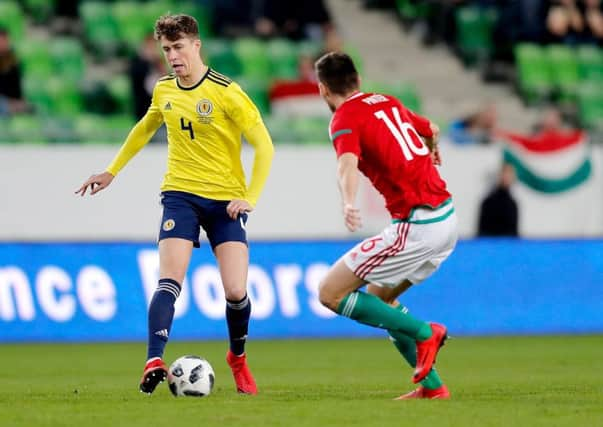Old Firm game convinced Alex McLeish to pick Jack Hendry


The debate about the pros and cons of a three-man defence will rage until Scotland next step out for action against Peru in May, and beyond.
Alex McLeish has not committed to employing this approach in every outing. The nature of the opposition will dictate how he decides to line up, rightly so. But there was enough evidence during Tuesday’s 1-0 win over Hungary to satisfy observers of the potential rewards from persisting with this formation.
Advertisement
Hide AdAdvertisement
Hide AdIt is reckoned to be particularly attractive since it is a way to ensure two of Scotland’s best players, both left-backs, can be accommodated in the team.
Only one of them played in Budapest. Andy Robertson, pictured, was deployed at left wing-back but played more like an orthodox winger judging by the number of times he got forward, picked out by Scott McKenna. Kieran Tierney will return, perhaps as a left centre-half. This seems to be the main basis for McLeish trialling the three-at-the-back arrangement. The fact right back remains a problem area provides further persuasion.
But centre-half, thanks to the emergence of Aberdeen’s McKenna and Celtic’s Jack Hendry, is not quite the yawning, option-less chasm it once was – or Gordon Strachan had us believe was the case. It’s odd to hear a manager praise a centre-half for heading the ball. It would seem a basic requirement. McLeish noted yesterday, during a discussion following the win in Budapest that helped provide his reign with lift-off, how fewer centre-halves can head the ball properly in the modern game. McLeish is too humble to add, “as well as I could”.
However, it stands to reason that employing a former centre-half as manager helps when you are trying to improve this particular area of the team. McLeish revealed there was intense work done with Hendry and McKenna to improve their heading in training over the course of the last few days.
“A lot of centre-halves nowadays don’t head the ball,” he said. “But when you look at the top teams, they have fantastic centre-halves who are aggressive in the air – Ramos with Real Madrid, Pique with Barcelona. And they can play as well. If we can nurture guys like Jack, I’m sure Brendan Rodgers would have been delighted to see his performance, as would Derek McInnes with Scott McKenna.”
McKenna and Hendry, 21 and 22 years old respectively, are very different players. The former is a brawny, some might say uncomplicated, defender, while the latter puts one in mind of a ball-playing centre-half like Alan Hansen, or even, dare we say it, a young McLeish. Both share McLeish’s impressive stature as well. Indeed, they are loftier than he was and, in McKenna’s case, broader.
“They are even bigger than I was,” said the manager when it was put to him they share some of his characteristics. “I would love to see these guys going on to get many, many caps for Scotland.”
McKenna now has two, Hendry one. They are a long way from the 77 McLeish amassed. Not all of these were earned at centre-half. McLeish recalled recently being played in midfield when he made his debut. But there are few around with his understanding of how to play the role.
Advertisement
Hide AdAdvertisement
Hide AdSome of it McLeish puts down to instinct. Watching Hendry come on as a second-half substitute for Celtic to help their efforts to repel Rangers after being reduced to ten men, McLeish saw someone exhibit the qualities required at international level. Hendry was not even playing in his preferred position. Pushed on at right-back, as he also was against Aberdeen at Pittodrie shortly after arriving at Parkhead, Hendry showed the nerveless composure reproduced in Budapest.
The only one not getting carried away seems to be Hendry himself. His ascent has been remarkable this season since Dundee manager Neil McCann brought him to Dens Park following a patchy spell with Wigan Athletic. Signs were initially underwhelming. Few Dundee fans were convinced by a shaky display in a friendly against Arbroath, when he conceded a first-half penalty.
But Hendry has not looked back since scoring a late winner against Raith Rovers on his competitive debut for Dundee, earning a move to Celtic after impressing Brendan Rodgers in a 1-0 defeat by Celtic in September. McLeish was another left instantly impressed by the player. “I brought Jack in because I saw him in one game – he came on as a sub for Celtic against Rangers,” he recalled. “I loved his composure for a young kid coming into an Old Firm game. I thought ‘I’m going to do a wild card here’. Thankfully, my eyes were correct.
“We did some team work last week,” he added. “With Jack, there were a couple of things in training I pointed out to him. I can’t tell him everything in one night, but we made him aware of their [Hungary’s] strikers.”
If the point of these friendlies was to blood youngsters and learn how they cope, then it has been a successful few days, regardless of results. But Tuesday’s win provided McLeish with a positive outcome to wield as evidence his methods are beginning to work. All enterprises, even such fledgling ones as McLeish’s second spell with Scotland, require proof of progress. It’s why the result meant so much to him. Otherwise, as he himself smiled on the eve of the Hungary fixture, he risked being “an even bigger dud than I was on Friday”.
The loss of what proved the decisive goal against Costa Rica so early in the game can be put down to teething problems. While Scotland rode their luck at times against Hungary and needed goalkeeper Allan McGregor to come to the rescue on a couple of occasions in the second half, there were signs of a plan coming together, particularly at the back.
We should have faith in McLeish to get this right, at least.